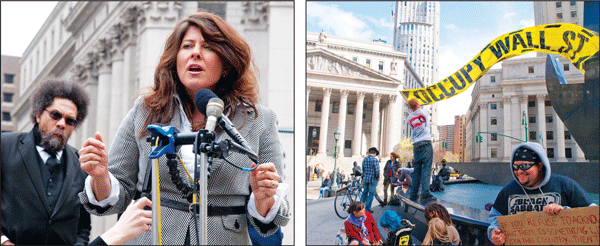
BY DUNCAN OSBORNE | There were moments at the Aug. 20 debate among the three candidates for the state Senate seat currently held by Tom Duane when it looked like a debate might break out.
“I don’t fill shoes,” said Tom Greco, the straight owner of the Ritz Bar and Lounge, a popular Hell’s Kitchen gay bar. “I wear my own.”
Moments before, Brad Hoylman, the presumptive front-runner in the race, told a crowd of roughly 100 that had gathered at the Lesbian, Gay, Bisexual and Transgender Community Center, on W. 13th St., that “A lot of people tell me that Tom Duane is a hard act to follow.”
For the past 14 years, Duane, who is openly gay, has represented the district that runs from W. 72nd St. to the West Village and from river to river in its Lower Manhattan portion. He is a legendary liberal Democrat.
Hoylman never fails to salute Duane when he campaigns. The fact that Hoylman appears to have been selected as the incumbent’s heir was an issue.
“How are you supposed to get new ideas?” said Greco. “You need new ideas, fresh ideas, fresh people.”
The 90-minute debate, which was sponsored by Citizens Union, a nonpartisan civic group, and NYC Community Media, the parent of The Villager, the East Villager, Gay City News, Chelsea Now and Downtown Express, did showcase Hoylman’s better grasp on solutions to problems facing the district, New York City and the state, but it also demonstrated the extent to which the candidates agree.
Tanika Inlaw, a public school teacher, identified her top three priorities if elected as defending and improving public education, building and protecting affordable housing and campaign finance reform. Hoylman and Greco certainly support those goals.
All three agreed that hydrofracking must be stopped, that public pensions must be sustained, and that the police practice of stop-and-frisk must end.
Ultimately, the winner of the Sept. 13 Democratic primary (held on a Thursday in deference to the 9/11 anniversary), which will decide who takes the seat, may be determined by more practical matters. Hoylman has far more money and far more political infrastructure behind him.
In his most recent filing with the state Board of Elections, Hoylman had an opening balance of roughly $171,000. He raised more than $80,000 since his previous filing just weeks before, and had $209,416.45 in cash on hand. His money has come from the gay community, unions, Wall Street and real estate interests.
Greco had an opening balance of $13,600. He raised $8,775 since the earlier report and had $16,875 in cash on hand.
Inlaw, who has filed one campaign finance report but not the most recently required follow-up, has loaned her campaign $1,403 and received a single donation of $150. She has debts, including her loan, of $2,748. As of July 17, she had $353 in cash on hand.
Like Greco, Inlaw took a poke at Hoylman’s backers.
“Unlike my opponent, I don’t have any special-interests groups behind me,” she said. “I’m a public school teacher, I’m an ordinary American.”
Hoylman’s 12 years at the Partnership for New York City, a major business lobby, also came up. Bill Rudin, the chief executive officer of the real estate firm Rudin Management Company, is affiliated with the Partnership and with New York University.
The Rudin company is converting the St. Vincent’s Hospital property in the West Village into high-end apartments. The university just won city permission for a major expansion. Both plans are very controversial.
Hoylman said, “Absolutely” when Greco asked him if he had done everything he could to save the hospital, “given your day job.” Hoylman added, “St. Vincent’s closed partly because of mismanagement. This was its second bankruptcy.”
Hoylman was chairperson of Community Board 2, representing the Village area, until he stepped down to run for state Senate.
Hoylman differentiated himself by pressing for specific solutions. Rather than making cuts in the face of expected multibillion-dollar state budget gaps, he wants new revenue sources. He noted that 20 percent of New York City residents are living in poverty.
“It’s this growing gap between the rich and the poor that really undermines our society,” Hoylman said. “We need a real millionaires’ tax. The governor cut our millionaires’ tax in half.”
When discussing funding for the cash-strapped Hudson River Park Trust, the state-city authority that administers the West Side’s Hudson River Park, Hoylman suggested using money from lawsuit settlements won by the Lower Manhattan Development Corporation or from a state bank regulator that just collected $340 million.
“We need to identify more revenue sources,” Hoylman said.

































